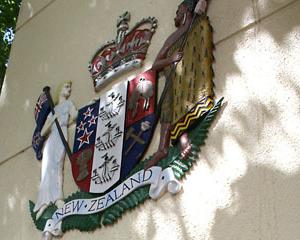
Dr Collins made the statement on the opening day of a case alleging Fairfax New Zealand Ltd and Dominion Post editor Tim Pankhurst committed a contempt by publishing 13 extracts last November from conversations recorded during police surveillance of people suspected of terrorism.
The interceptions were police evidence collected during last year's raids near Whakatane, but not used in court after a decision not to prosecute under the Suppression of Terrorism Act.
The newspaper said the information came from a leaked 156-page affidavit police used to gain search warrants for the raids.
The police operation was completed on October 15 with an initial 16 people arrested and charged with arms offences.
"The decision to bring contempt proceedings was only made after carefully assessing the contents of the Fairfax articles against the right to fair trials for those awaiting trial on the Arms Act charges - fair trial rights to which all New Zealanders are entitled," Dr Collins said.
As part of that assessment careful comparisons were made between the Fairfax articles and other instances of contempt on both sides of the Tasman.
"The assessment made in this case was that the Fairfax articles were the most serious and inexcusable breaches of an accused's fair trial rights that this country has seen," Dr Collins said in his opening address.
"The Fairfax articles were inflammatory, unsettling, provocative and memorable - the respondents sought to publish them as widely as possible.
"Thankfully, they can [be] characterised as unique, and in a league of their own when it comes to instances of contempt."
In their arguments, the respondents effectively labelled as `terrorists' those accused waiting trial on arms charges, and generated fear and hostility towards them.
Fairfax also published material which it knew could not be used at the trial of the people facing arms charges, acted contrary to suppression orders of the High Court and District Court and undermined the opportunity of Arms Act defendants to advance a defence.
"Never before has a respondent to a contempt application in this country offended in such a serious and multiple way," he said.
The trial, before Justice Gendall and Justice Randerson, started with Dr Collins seeking interim suppression orders on the extracts of intercepted conversations, and a policeman's affidavit.
The court suppressed references to 13 extracts from interceptions and material from an affidavit with the order to be reviewed at the end of the trial.
Dr Collins said he did not want reporting of the Wellington hearing to compound the alleged contempt committed by the Fairfax publications in November last year.
Materials published in The Dominion Post were also published in other Fairfax papers, including The Press, Timaru Herald, The Daily News, Waikato Times, Southland Times and on the Stuff website on November 14.
Dr Collins said this breached suppression orders made during bail hearings for 16 people charged with arms offences.
He said four of the 16 people had never been subject to police plans to seek charges under the Suppression of Terrorism Act.
Because charges under the Act were declined which meant that the intercepted conversations could not be used in Arms Act prosecutions.
Dr Collins said he would address the issue of the extent to which the newspapers considered they were better placed than the courts to decide whether publication of material would interfere with the administration of justice and provision of a fair trial.












